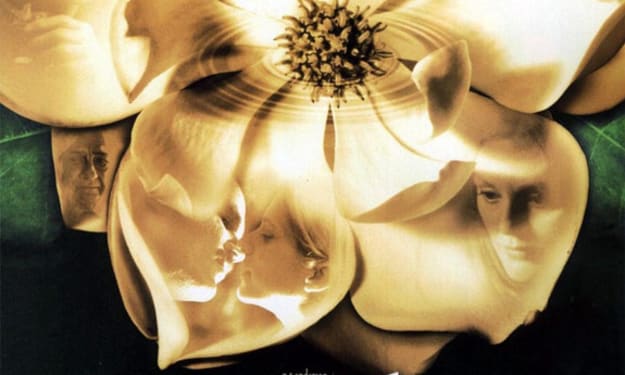‘Trainspotting’ (1996) Film Review
A review for Danny Boyle’s 1996 Scottish classic film “Trainspotting.”

“Trainspotting” is defined as the practice of venturing to a railway station and logging the number of trains that one sees. Though the characters do, quite literally, idle along a railway and watch as trains pass by in one particular scene of Trainspotting, the term serves as a double-entendre in the context of this film; it also refers to the track marks left on one’s arm from the use of hypodermic drugs.
In his 1996 film, Danny Boyle illustrates the life of a drug addict residing in the alpine capital of Scotland through its protagonist, Mark Renton (Ewan McGregor), and his friends. Their customs are emphasized by the drabness of a run-down drug den in a country that they don’t even want to be in—Renton himself saying, “It’s sh*te being Scottish! We’re the lowest of the low. The scum of the f***ing Earth! The most wretched, miserable, servile, pathetic trash that was ever sh*t into civilization.” From the beginning, Renton’s longing to unshackle himself from the chains of Edinburgh and start anew is foreshadowed, and his moral ambiguity throughout the film only cements that into place. Each of the characters—Spud (Ewen Bremner), Begbie (Robert Carlyle), Sick Boy (Jonny Lee Miller), and Tommy (Kevin McKidd)—including himself is flawed in his own ways: Spud is essentially the vacuous punching bag of their circle, Begbie is short-tempered and volatile, Sick Boy is lost in his own fictional Hollywood fantasies and gloats about his lack of need for drugs to his addict peers, and Tommy is susceptible to his friends’ opioid perils. There’s a wry undercurrent whenever the characters exhibit these traits to an extent where a callow teenager might watch this and think they want such a friendship in the real world, but when you truly consider how their dynamic causes them to clash, it is not ideal at all. Most of them are so in thrall to heroin that you think any optimism for eventual rehabilitation is for naught. When Renton is involuntarily sent to rehab by law, there’s a faint spark of hope for him, but it is quenched as quickly as it was ignited because he succumbs to his addiction at the given first opportunity.
Something that stands out to me about Trainspotting is its soundtrack, mainly composed of tracks from Iggy Pop’s 1977 album Lust for Life, along with various club music. There’s a song titled “Dark & Long” by Underworld that plays during the infamous (and my personal favorite) scene in which Renton endures the effects of quitting heroin cold turkey. While he writhes under the covers of his childhood twin bed, sweating profusely and wailing for another fix, even for a singular dose of methadone—surrounded by walls embellished with train imagery, which are like an echo chamber to his own desperate voice—that song plays as a subdued electronic beat in the background. It creates a stark contrast between what the audience is listening to and what is actually happening on screen, where Renton is so disoriented that he experiences illusions. He sees Tommy, now with a pallid face and purple crescents underneath his eyes, and his earlier love interest Diane, singing New Order’s “Temptation” to him in a lullaby-like voice. What Renton witnesses are manifestations of his perverted deeds and he responds to them with anguish, suggesting that he regrets feeding into Tommy’s addiction and sleeping with Diane while she was underaged. These actions have been weighing on his mind so heavily that the remorse brings them to life in his feeble brain.
Renton is a deeply flawed character who indulges in the luxury of his vices. However, in the end, he seems to overcome this part of himself when he stumbles upon a chance to start fresh, just as he’s been wanting to. The four travel to London to complete a promising heroin transaction, from which they come out with £16,000. The next day, Renton awakens before the rest do in their cramped, single-bed hotel room and takes the money they earned from Begbie, who had been cradling it in his arms like an infant to ensure nobody stole it. As he’s slipping out the door, Spud is stirred out of his slumber by the movement and silently urges him not to go, to no avail. Renton leaves £2,000 in Spud’s locker, showing the soft spot that he had for him all along.
In the last shot, Renton strolls along a busy sidewalk in London with the bag of money slung over his shoulder, a triumphant grin on his face. From afar, he stands out from the people walking around him—but in his mind, he begins to perceive himself as one of them. His final narration is like a defeated confession of all his wrongdoings, but finally, there’s that spark of hope for him that we’ve been waiting for, but now in full flame. “So, why did I do it? I could offer a million answers, all false. The truth is that I’m a bad person. But that’s going to change. I’m going to change. This is the last of that sort of thing. I’m cleaning up and I’m moving on, going straight and choosing life.”
About the Creator
Anna Cheney
Putting my thoughts & feelings into words.






Comments
There are no comments for this story
Be the first to respond and start the conversation.